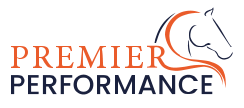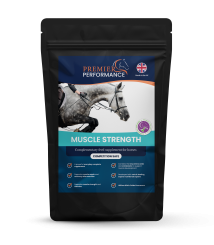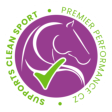in basket
TOP OFFER - SUMMER20 - 20% OFF and 4 FREE seasonal products!
Muscle development, stamina and recovery in horses

What is muscle?
The main component of muscle is protein, and protein in your horse’s diet is required for the formation and repair of muscles, as well as other soft tissues in the body.
After water, protein is the second major component of body tissues. Proteins are composed of amino acids that are individual units that combine to make up the protein. There are 22 amino acids that are structured in different ways to make proteins of different sizes and shapes and with a variety of functions. An example of a muscle protein is myosin, which helps with muscle contraction. Another example of a protein is haemoglobin, which carries oxygen in the blood.
The role of protein in a horse's diet
The horse needs to have protein in his diet because although some amino acids are made in the body others are not, and these are called the essential amino acids. The essential amino acids for horses include lysine, methionine and threonine and these need to be supplied in your horse’s diet. If these essential amino acids are not provided this means that certain proteins cannot be formed. How much protein your horse needs very much depends on a number of factors, including age, life stage (e.g. if your horse is still growing, pregnant or lactating), and workload. From what we know, it appears to be the protein that is digested in the small intestine of the horses that is of direct benefit to the horse. Protein that escapes digestion in the small intestine will enter the large intestine where it will be used primarily by the microbial population.
Muscle development in horses
Your horse’s body contains a large amount of muscle, which makes up between 40 and 55 percent of their total body weight. Muscle itself contains around 70 percent water, 20 percent protein and 10 percent fat, glycogen, vitamins and minerals. However, proteins make up the majority of solid skeletal muscles and therefore are of particular interest in performance horses. It takes time and effort to build muscle in your horses and understanding the factors that help a horse to build or lose muscle can be of great benefit in training. Muscle mass is determined by protein synthesis and breakdown (also known as protein turnover) and this happens simultaneously.
During exercise there is an increase in muscle protein turnover, which means that the body breaks down the protein and then re-synthesises it. This process is an important cycle of events for building muscle and therefore the greater protein turnover results in increased muscle mass. There are a number of factors that affect muscle mass including, age, health status, hormones, medications, level of physical activity, and nutrition.
The amount of protein a horse requires in his diet has been the subject of much debate; however, it is generally believed that exercising horses have higher protein requirements compared to horses that are not in work. It is important to be aware that overfeeding protein does not result in improved performance as excess protein is broken down and excreted in urine. On the other hand, if protein intake is insufficient this could result in poor performance, weight loss and poor muscle tone. Therefore, it is important to get the balance right. There is also evidence that synergistic effects of exercise and nutrition can have a positive effect on protein turnover in muscles, potentially increasing muscle mass.
Equine muscle stamina
Muscles fatigue during exercise and there are two main causes of fatigue:
- Neural fatigue, which is where the nerves responsible for the contraction of muscles become limited in their ability to generate a signal for the muscle to contract
- Metabolic fatigue, which is a term used to describe a reduction in the ability of the muscle fibre to contract.
Metabolic fatigue can be due to a shortage in fuel within the muscle and/or an accumulation of substances (also known as metabolites) within the muscle, which affects the ability of the muscle to contract.
L-arginine supplementation has been reported to enhance physical exercise capacity in some individuals, particularly those that are unfit or have an illness or injury affecting their ability to exercise. L-arginine is an amino acid required for the synthesis of creatine, which is an essential energy source for muscle contraction. In human athletes, L-arginine supplementation has been shown to delay the onset of fatigue (or time to exhaustion), as well as reducing blood pressure, increasing oxygen uptake and increasing muscle performance and muscle strength, suggesting that it may have beneficial effects on exercise performance. L-arginine has also been seen to decrease inflammation and enhance muscle regeneration in animals. However, other studies have reported no effects, which appears to be attributable to the level of L-arginine supplementation and the addition of other supplements. Supplementation of L-arginine has also been shown to improve antioxidant levels during exercise, which are often depleted and can lead to ill-health in athletes. Studies have suggested that L-arginine supplementation may also have a beneficial impact on thermoregulation in horses.
Branched chain amino acids (BCAAs), such as valine, can also help enhance metabolism, which can improve exercise performance as well as recovery during exercise. Studies in humans have shown BCAA supplementation to reduce physical and mental fatigue, with study participants reporting up to 15 percent less fatigue compared to those given no BCAA (placebo). Other studies in humans have reported over 30 percent less muscle soreness with BCAA supplementation compared to those given a placebo. In fact, it has been shown in humans that those given BCAA supplementation performed better when they performed the same strength-training 24-48 hours later. BCAAs have also been reported to prevent a serum decline in BCAAs during exercise, which can help to prevent fatigue. When serum BCAA levels drop this normally causes an increase in tryptophan leading to more serotonin being produced, which can contribute to fatigue. In humans, those that consumed a drink containing BCAA during exercise were able to exercise for longer before feeling fatigued, which could be of particular benefit in endurance horses.
It also appears that BCAA is more effective at reducing fatigue in individuals that are unfit compared to those in training, which may suggest that BCAA supplementation can be of benefit in horses that are being fittened. However, exercise-induced fatigue is multifactorial and further work in horses is required. Contrary to other amino acids, BCAAs are mostly broken down in the muscle instead of the liver. Consequently, they are thought to play a role in energy production during exercise, particularly isoleucine. BCAAs are also reported to play a role in regulating blood sugar levels by increasing insulin secretion and increasing the uptake of glucose into muscles, thereby decreasing blood sugar levels. However, work is required to determine these effects in horses.
Muscle recovery in horses
During the recovery period after exercise, muscle protein synthesis takes place to repair muscle tissue damage that occurred during exercise. It has been reported that supplementing your horse’s diet with amino acids, such as valine, can have a positive effect on the rate of protein turnover; however, more recently work has been done demonstrating that supplementing the exercising horse’s diet with both amino acids and carbohydrates (CHO) post-exercise can have a greater effect on building muscle. Supplementing with CHO alone is unlikely to increase muscle mass and it is the same for exercise alone without amino acid supplementation.
Much more research has been done on protein and CHO supplementation in human athletes than horses. However, there is some evidence that if branched chain amino acids (BCAA) such as leucine, isoleucine and valine are provided in the diet in adequate amounts post-exercise (24 to 48 hours after) then this may aid recovery by supporting protein synthesis.
One significant difference between horses and humans is that horses do not restore their muscle glycogen stores quickly, it can take up to 72 hours for glycogen stores to be replenished in horses regardless of the type or amount of feed provided. You may have heard of “carb loading” in humans, but this doesn’t work well in horses as horses are not capable of restoring their glycogen reserves at the same speed humans do. There have been research studies done to evaluate feeding high amounts of starch to horses after exercise and the results showed that even if horses eat very high amounts of starch after competition this does not speed up the rate at which glycogen stores are returned to pre-competition levels. In fact, feeding high amounts of starch can be detrimental as this can also lead to colic and other gastrointestinal disturbances in horses.
When energy is created for muscle contraction free radicals are produced, which are detrimental to health if they are not removed – often referred to as free radical damage. Feeding vitamin E is thought to help prevent significant free radical damage. To ensure your horse is getting enough vitamin E his diet should contain enough vitamin E to meet his requirements. However, even when horses are fed according to recommendations for vitamin E requirements, variation in requirements between individuals mean some horses may be vitamin E deficient. You can ask your veterinarian to test your horse’s serum vitamin E levels to ascertain if your horse’s diet is meeting his requirements. There is also some evidence that feeding additional vitamin E after competition may help with recovery. Premier Performance Muscle Strength Supplement is designed to complement good management and training practices by helping to support your horse’s development, fitness and recovery
Overall recommendations for supporting muscle development, stamina and recovery in horses
- Provide good-quality forage to help replenish CHOs safely and encourage drinking.
- Provide electrolytes daily as part of your horse’s diet.
- Provide access to water pre- and post-competition.
- Amino acid supplementation can improve muscle development and recovery.
- Ensure adequate dietary vitamin E is provided.
Article written for Premier Performance by Professor Jo-Anne Murray.







